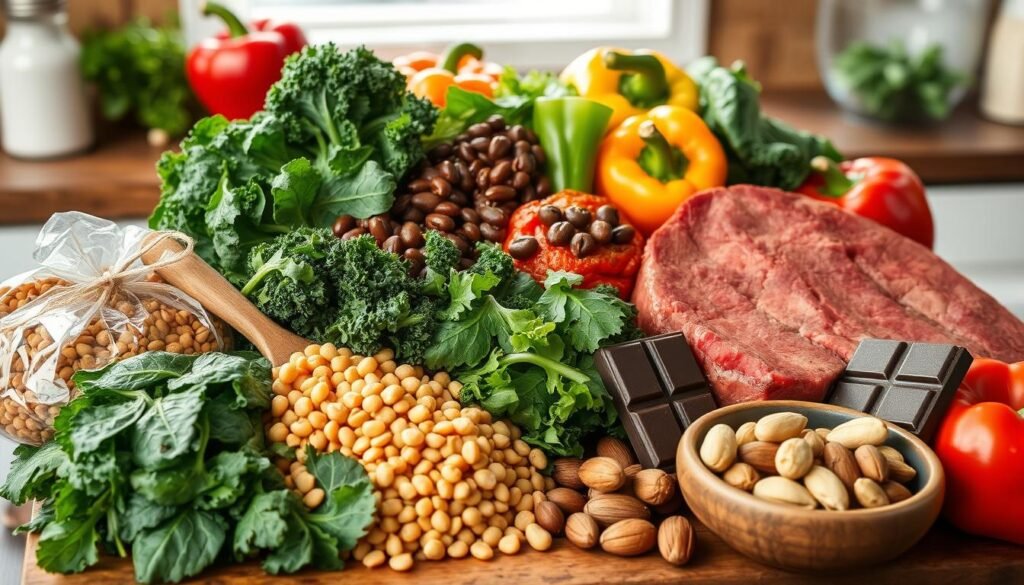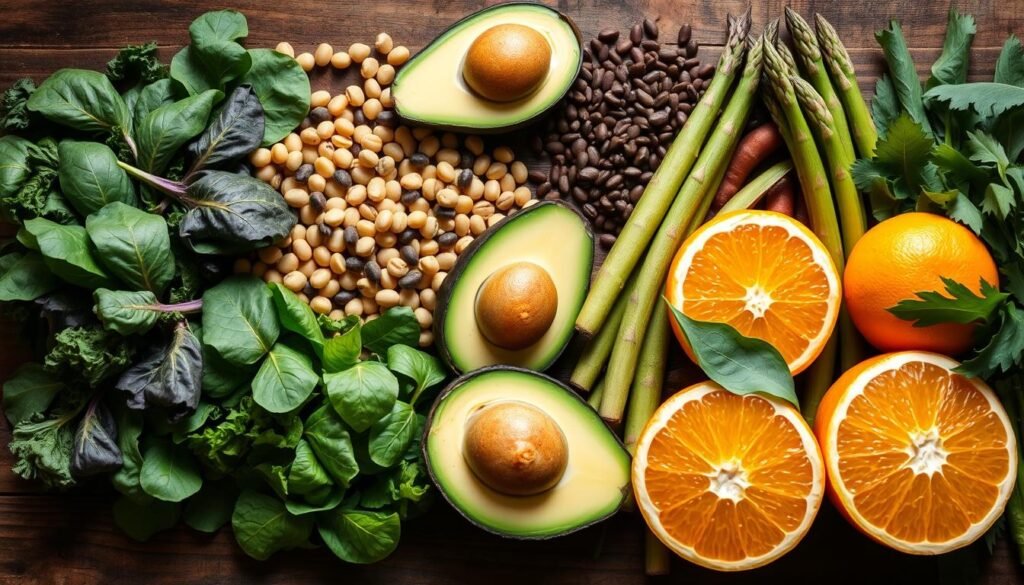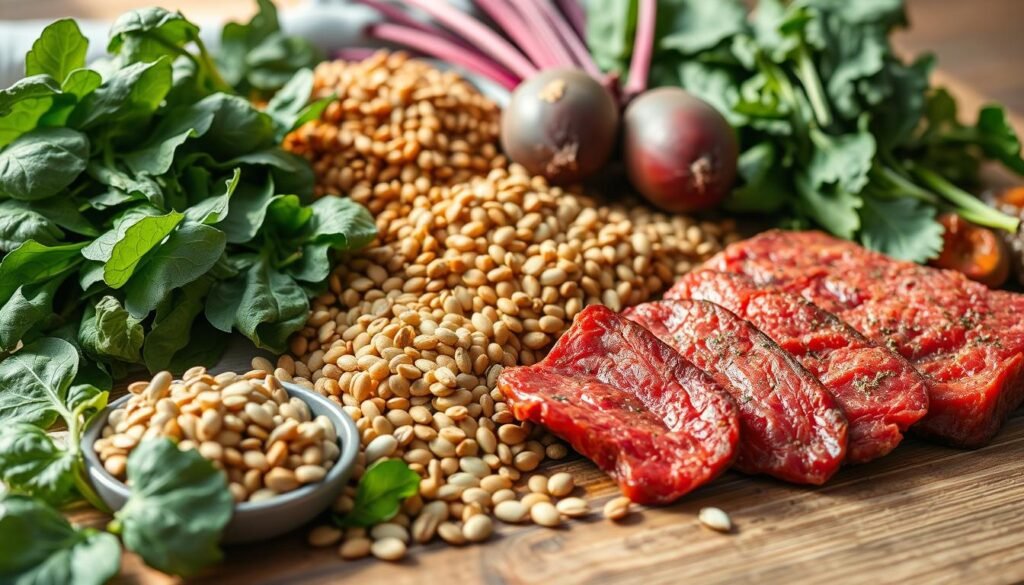Have you ever wondered why some people are always tired, even with enough sleep? This fatigue could be a sign of anemia. Anemia means you have too few healthy red blood cells. Knowing what nutrients you need is key to fight anemia. It boosts your energy and overall health.
A diet full of anemia-fighting nutrients is very important. This is because some eating habits in the U.S. might lead to not getting enough nutrients. To keep your blood healthy, it’s crucial to know what your body needs.
Key Takeaways
- Identifying anemia starts with recognizing signs like constant fatigue.
- A balanced diet rich in essential nutrients is crucial for preventing anemia.
- Modern eating habits often lack key anemia-fighting nutrients.
- Understanding dietary sources of iron and vitamins is essential for blood health.
- A proactive approach can lead to a healthier lifestyle and improved well-being.
Understanding Anemia
Anemia is having too few red blood cells or not enough hemoglobin in your blood. This problem makes it hard for your body to carry oxygen. You might feel very tired, weak, or look pale. When moving or exercising, you might get dizzy or have trouble breathing.
There are different kinds of anemia, each with its own cause. For example, not having enough iron means your body can’t make hemoglobin. This is called iron-deficiency anemia. Another kind, called pernicious anemia, happens when your body can’t take in enough vitamin B12. Knowing about these types helps us find out why anemia happens and how to treat it.
Oxygen is crucial for our bodies, and anemia messes with its transport. This can seriously affect our health. That’s why we must spot anemia signs early. By getting checked out by a doctor and maybe changing what you eat, you can get better and feel good again.
What Causes Anemia?
Anemia comes from different causes of anemia and greatly affects health. A main cause is nutritional deficiencies. Not getting enough nutrients like iron, folic acid, and vitamin B12 lowers red blood cell production. This makes the body struggle to make enough hemoglobin, which is vital for carrying oxygen in the blood.
Chronic diseases also lead to anemia. Conditions such as kidney disease or cancer interfere with how the body makes red blood cells. Genetic conditions, like thalassemia or sickle cell anemia, are another major factor. They show the varied reasons behind this disorder.
Lifestyle factors also play a big part in understanding the causes of anemia. Bad eating habits, where people don’t eat a well-rounded diet, result in key nutrient shortages. Problems absorbing nutrients in the gut further increase the risk of developing anemia.
Environmental and lifestyle elements, like stress and certain medical treatments, add to the problem. To dive deeper into how iron deficiency leads to these issues, more detailed information is available here: iron deficiency anemia symptoms and causes.
| Cause | Explanation |
|---|---|
| Nutritional Deficiencies | Insufficient intake of iron, folic acid, and vitamin B12. |
| Chronic Diseases | Conditions like kidney disease or cancer affecting cell production. |
| Genetic Conditions | Inherited traits affecting hemoglobin or red blood cell production. |
| Lifestyle Factors | Poor diet and absorption issues due to gastrointestinal health. |
Essential Nutrients for Combating Anemia
Understanding how to fight anemia through diet is key to good health. Eating a balanced diet with certain nutrients helps a lot with anemia. Iron and vitamins are very important for making red blood cells and keeping blood healthy.
Importance of Iron in Preventing Anemia
Iron is vital. It helps make hemoglobin, which carries oxygen in our blood. There are two kinds of iron: heme and non-heme. Heme iron comes from meat, and non-heme iron comes from plants. Eating foods rich in both types of iron is critical to prevent and manage anemia.
Studies show taking iron supplements can boost hemoglobin. This lowers anemia risk for many people. For more information, check out this research.
Role of Vitamins in Combating Anemia
Some vitamins are key to fighting anemia. Vitamins C and B12 are especially important. They help your body absorb iron and keep you healthy. Vitamin C boosts non-heme iron absorption from plant foods. Meanwhile, vitamin B12 is necessary for making DNA in red blood cells. It also prevents a type of anemia where the cells are too big. Getting enough of these vitamins with iron is a big part of managing anemia.
Iron-Rich Foods to Include in Your Diet
Eating a balanced diet is key to managing iron deficiency anemia. Variety of iron-rich foods can greatly improve your health. These include two main types: red meat and poultry, and different plant-based iron sources.
Red Meat and Poultry
Red meat and poultry are great for heme iron, which your body absorbs well. Foods like beef, lamb, and chicken boost iron levels. Add these to meals for better daily iron, especially if you’re at risk of anemia.
Plant-Based Iron Sources
For vegetarians or vegans, plant-based iron sources are a good choice. These include beans, lentils, tofu, spinach, and quinoa with non-heme iron. Eat these with vitamin C foods like oranges and bell peppers to help your body absorb iron. Adding these to your meals helps keep your iron levels healthy.
| Food Source | Type of Iron | Iron Content (mg per 100g) |
|---|---|---|
| Beef | Heme | 2.7 |
| Lentils | Non-Heme | 3.0 |
| Chicken | Heme | 1.2 |
| Spinach | Non-Heme | 2.7 |
| Quinoa | Non-Heme | 1.5 |
It’s good to eat both animal and plant-based iron foods for a balanced diet. For more detailed advice on iron deficiency, check the information found here.

Vitamins for Anemia: A Closer Look
Two vital vitamins for beating anemia are vitamin C and B12. These vitamins do more than provide nutrients. They boost overall health.
The Role of Vitamin C
Vitamin C is key in how the body absorbs iron. It changes iron into a form the body can use easily. This increases how well dietary iron works.
Eating foods high in vitamin C helps with iron absorption. Such foods include:
- Oranges
- Strawberries
- Kiwis
- Red bell peppers
- Broccoli
These foods not only improve iron uptake but also enhance immune health.
Vitamin B12 and Its Importance
Vitamin B12 is crucial for making red blood cells. Without enough, you could get megaloblastic anemia. This condition creates overly large red blood cells. B12 is mainly found in animal products like:
- Meat
- Dairy products
- Eggs
Those on a vegetarian or vegan diet should add fortified foods or B12 supplements. This ensures they get enough daily.
| Vitamin | Role | Main Sources |
|---|---|---|
| Vitamin C | Enhances iron absorption | Oranges, strawberries, broccoli |
| Vitamin B12 | Essential for red blood cell formation | Meat, dairy products, fortified foods |
Foods to Boost Hemoglobin Levels
Keeping your hemoglobin levels up is key for feeling energetic and healthy. Eating certain foods can really help boost your hemoglobin. Foods to boost hemoglobin include:
- Dark leafy greens, such as spinach and kale
- Pulses like lentils and chickpeas
- Nuts and seeds, especially pumpkin seeds and almonds
- Dried fruits like apricots and raisins
These foods are packed with nutrients that help make hemoglobin. For example, dark leafy greens have lots of iron. Nuts and seeds bring healthy fats and vitamins that blood needs. Adding foods to boost hemoglobin to your diet can make you feel more energetic and spread oxygen better around your body.
Eat these foods with vitamin C-rich ones like oranges or bell peppers. This helps your body absorb iron better. A diet with these key foods supports your hemoglobin and leads to a healthier you.
| Food Item | Key Nutrients | Benefits |
|---|---|---|
| Spinach | Iron, Vitamin K | Boosts red blood cell production |
| Lentils | Protein, Iron, Folate | Supports energy and hemoglobin production |
| Pumpkin seeds | Iron, Zinc | Enhances immune function and blood health |
| Dried apricots | Iron, Vitamin A | Good for maintaining healthy vision and iron levels |
Best Nutrients for Iron Deficiency
Addressing iron deficiency means knowing different types of iron and how to best absorb them. It’s vital to know the best nutrients for iron deficiency. Understanding heme and non-heme iron differences is key to a good diet plan.
Understanding Heme vs. Non-Heme Iron
Heme iron comes from animal products like red meat, fish, and poultry. Your body absorbs it well. Non-heme iron is in plant foods such as lentils, beans, and spinach. It’s nutritious but harder for the body to absorb. Knowing the difference between heme vs. non-heme iron helps plan your diet better.
How to Enhance Iron Absorption
To boost your iron levels, certain strategies work well:
- Combine iron-rich foods with vitamin C to enhance absorption.
- Avoid calcium-rich foods when eating iron, as calcium can block iron absorption.
- Eat foods high in vitamin A to help your body use iron more efficiently.
- Steer clear of coffee and tea during meals to avoid inhibiting iron absorption.
These approaches will help maintain healthy iron levels and fight off deficiency.
| Type of Iron | Source | Absorption Rate |
|---|---|---|
| Heme Iron | Red meat, poultry, fish | 15-35% |
| Non-Heme Iron | Lentils, beans, spinach | 2-20% |
Foods High in Folic Acid
Folic acid, or vitamin B9, is key for making red blood cells. It’s a must-have nutrient for fighting anemia. Eating foods high in folic acid boosts health and well-being.
Adults need about 400 micrograms of folic acid daily. It’s simple and fun to eat more folic acid-rich foods. Let’s check out some top food choices:
- Avocados
- Bananas
- Fortified cereals
- Leafy green vegetables (like spinach and kale)
- Legumes, such as lentils and chickpeas
Getting creative with meals makes eating these foods enjoyable. Try mixing bananas and spinach in a smoothie or topping your avocado toast with seeds. These ideas boost your folic acid and make meals tasty.

Eating a variety of these foods helps keep folic acid levels up. This supports your body against anemia and promotes overall health.
| Food | Folic Acid Content (mcg per serving) |
|---|---|
| Avocado (1 medium) | 120 |
| Banana (1 medium) | 24 |
| Fortified Cereals (1 cup) | 100 |
| Spinach (1 cup, cooked) | 263 |
| Chickpeas (1 cup, cooked) | 70 |
Iron Supplements for Anemia: What You Need to Know
If you’re battling anemia, iron supplements for anemia can help when food alone isn’t enough. These supplements come in forms like ferrous sulfate and ferrous gluconate. Each has its own rate of absorption and possible side effects. So, it’s key to know these differences before you start taking them.
Ferrous sulfate is a go-to option. It has more elemental iron per dose than other forms. Ferrous gluconate is easier on the stomach. This makes it better for people who are iron-sensitive. It’s important to watch your dosage and listen to medical advice for the best results.
You might face side effects like nausea, hard stools, and stomach aches. Taking iron with meals can ease these problems. Though, it might lower how well your body absorbs the iron. Before starting any iron supplement, talking to a healthcare pro is a must. This ensures you get what’s best for your needs.
It’s critical to know how to properly use iron supplements if you have anemia. A chat with a healthcare expert can guide you. They’ll recommend what’s best for your health situation.
| Supplement Type | Elemental Iron (mg) | Common Side Effects | Recommended Use |
|---|---|---|---|
| Ferrous Sulfate | 65 | Nausea, Stomach Cramps | With Food |
| Ferrous Gluconate | 36 | Less Intense GI Issues | With or Without Food |
| Ferrous Fumarate | 33 | Constipation | With Food |
Foods to Increase Red Blood Cells
Looking to boost your red blood cell count? Adding foods to increase red blood cells to your daily meals is key. Eating a balanced diet, filled with essential nutrients, fights anemia and improves health.
Eating iron-rich foods is vital for red blood cell production. Lean red meat, poultry, and fish are great sources of heme iron, which your body absorbs well. Foods like lentils, beans, and spinach provide non-heme iron, boosting your red blood cell levels.
Vitamins A and C shouldn’t be overlooked. Carrots and sweet potatoes, rich in vitamin A, and vitamin C-packed citrus fruits and bell peppers help your body absorb iron. This makes iron-rich foods more effective for your body to use.
Check out these key foods:
| Food | Type | Nutrient Content |
|---|---|---|
| Beef | Red Meat | High in Heme Iron |
| Chicken | Poultry | Good Source of Iron |
| Lentils | Legume | Rich in Non-Heme Iron |
| Spinach | Vegetable | Contains Non-Heme Iron |
| Citrus Fruits | Fruit | High in Vitamin C |
To see a real change in your red blood cell count, make these foods to increase red blood cells a staple in your diet. A mix of iron sources and vitamins can greatly raise your nutritional balance. For deeper understanding on meeting your nutritional needs, click here for more.

Creating an Anemia Prevention Diet
Creating an anemia prevention diet means choosing foods full of important nutrients. Aim for a balanced diet to boost iron levels and your health. Make sure you eat foods from different groups for all the nutrients you need.
Here are some important foods for an anemia diet:
- Lean proteins: Add red meat, chicken, turkey, and fish for top-notch heme iron sources.
- Green leafy vegetables: Spinach, kale, and broccoli offer lots of non-heme iron.
- Whole grains: Get nutrients from brown rice, quinoa, and fortified cereals.
- Legumes: Beans, lentils, and chickpeas have iron and vitamins.
- Fruits: Citrus fruits, strawberries, and bell peppers give you Vitamin C, boosting iron absorption.
When you plan meals, mix different foods to meet nutritional needs and keep things tasty. For example, try a spinach salad with grilled chicken. Or, mix chickpeas with a bowl of quinoa. This approach enhances meals nutritionally.
To stick to an anemia prevention diet, adopt these tips into your daily eating. Regularly update your meals based on what’s seasonally and locally available. This keeps your diet well-rounded and healthy.
Strategies for Maintaining Nutrient Balance
Keeping the right nutrient balance is key to avoiding anemia and staying healthy. There are many ways people can make sure they get the nutrients they need all the time.
One good approach is meal prepping. This lets people plan and make balanced meals ahead of time. It helps eat with thought, paying attention to how much and what’s in the food. Eating different kinds of food helps get all needed nutrients.
Staying hydrated is also important for getting nutrients into your cells. Drinking plenty of water each day helps move vitamins and minerals around the body. Try to limit drinks with a lot of sugar as they can mess up your nutrient balance.
- Regular health check-ups are crucial for keeping an eye on nutrients. Experts can spot shortages early on, so you can fix them quickly.
- Some people might need supplements if they don’t eat certain foods. But, always talk to a doctor before starting supplements.
- Choosing whole foods over processed ones means meals are richer in nutrients. Whole grains, fruits, veggies, and lean meats are great for nutrient balance.
Using these methods will help people improve their nutrient balance. This leads to better health and less chance of getting anemia.
| Strategy | Description |
|---|---|
| Meal Prepping | Planning and preparing balanced meals to ensure nutrient-rich options are readily available. |
| Mindful Eating | Focusing on portion sizes and the nutritional value of food consumed. |
| Hydration | Maintaining adequate water intake for optimal nutrient absorption. |
| Regular Check-ups | Monitoring nutrient levels with healthcare professionals to identify deficiencies early. |
| Whole Foods | Prioritizing entire ingredients over processed options for a nutrient-dense diet. |
Conclusion
Throughout this journey, readers discovered the key nutrients needed to fight anemia and their role in health. A balanced diet packed with iron and vitamins helps prevent anemia effectively. It shows the power of good food choices in managing this health issue.
Eating iron-rich foods like red meat, poultry, and plant-based options is vital. You should also include vitamins C and B12 in your diet. This approach helps boost hemoglobin and iron absorption. It shows how crucial these nutrients are for a healthy diet.
This discussion on anemia has informed many about taking control of their health. With the right food choices and knowledge, anyone can work towards a life full of vigor and good health results.